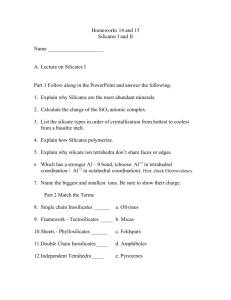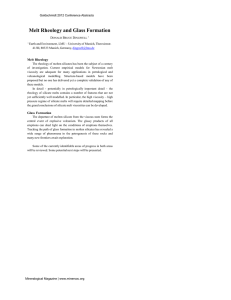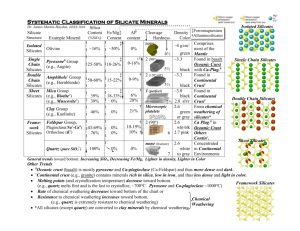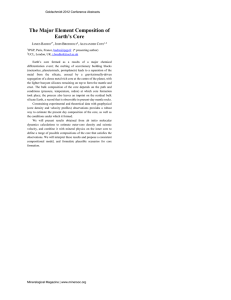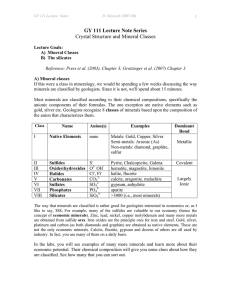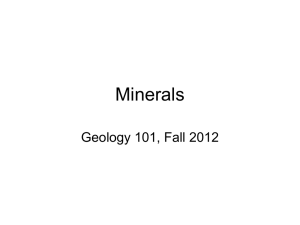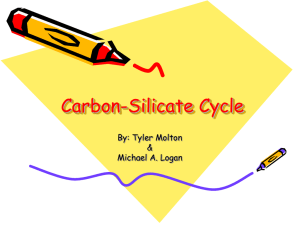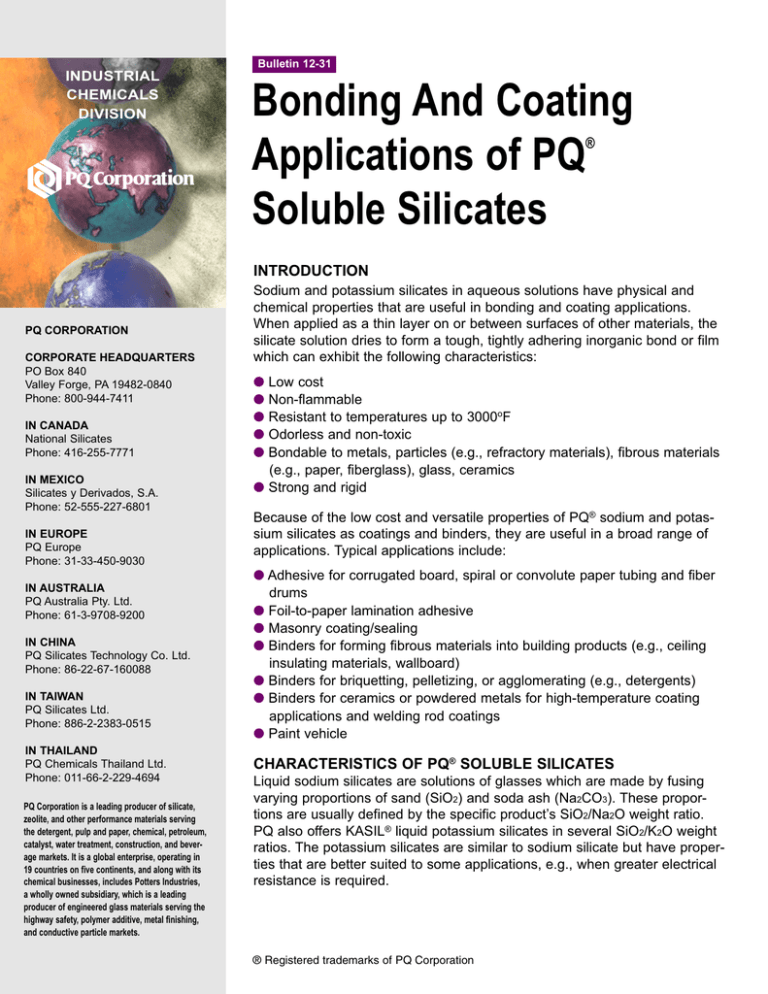
INDUSTRIAL
CHEMICALS
DIVISION
Bonding And Coating
Applications of PQ
Soluble Silicates
Bulletin 12-31
®
INTRODUCTION
PQ CORPORATION
CORPORATE HEADQUARTERS
PO Box 840
Valley Forge, PA 19482-0840
Phone: 800-944-7411
IN CANADA
National Silicates
Phone: 416-255-7771
IN MEXICO
Silicates y Derivados, S.A.
Phone: 52-555-227-6801
IN EUROPE
PQ Europe
Phone: 31-33-450-9030
IN AUSTRALIA
PQ Australia Pty. Ltd.
Phone: 61-3-9708-9200
IN CHINA
PQ Silicates Technology Co. Ltd.
Phone: 86-22-67-160088
IN TAIWAN
PQ Silicates Ltd.
Phone: 886-2-2383-0515
IN THAILAND
PQ Chemicals Thailand Ltd.
Phone: 011-66-2-229-4694
PQ Corporation is a leading producer of silicate,
zeolite, and other performance materials serving
the detergent, pulp and paper, chemical, petroleum,
catalyst, water treatment, construction, and beverage markets. It is a global enterprise, operating in
19 countries on five continents, and along with its
chemical businesses, includes Potters Industries,
a wholly owned subsidiary, which is a leading
producer of engineered glass materials serving the
highway safety, polymer additive, metal finishing,
and conductive particle markets.
Sodium and potassium silicates in aqueous solutions have physical and
chemical properties that are useful in bonding and coating applications.
When applied as a thin layer on or between surfaces of other materials, the
silicate solution dries to form a tough, tightly adhering inorganic bond or film
which can exhibit the following characteristics:
Low cost
Non-flammable
Resistant to temperatures up to 3000oF
Odorless and non-toxic
Bondable to metals, particles (e.g., refractory materials), fibrous materials
(e.g., paper, fiberglass), glass, ceramics
l Strong and rigid
l
l
l
l
l
Because of the low cost and versatile properties of PQ® sodium and potassium silicates as coatings and binders, they are useful in a broad range of
applications. Typical applications include:
l Adhesive for corrugated board, spiral or convolute paper tubing and fiber
drums
l Foil-to-paper lamination adhesive
l Masonry coating/sealing
l Binders for forming fibrous materials into building products (e.g., ceiling
insulating materials, wallboard)
l Binders for briquetting, pelletizing, or agglomerating (e.g., detergents)
l Binders for ceramics or powdered metals for high-temperature coating
applications and welding rod coatings
l Paint vehicle
CHARACTERISTICS OF PQ® SOLUBLE SILICATES
Liquid sodium silicates are solutions of glasses which are made by fusing
varying proportions of sand (SiO2) and soda ash (Na2CO3). These proportions are usually defined by the specific product’s SiO2/Na2O weight ratio.
PQ also offers KASIL® liquid potassium silicates in several SiO2/K2O weight
ratios. The potassium silicates are similar to sodium silicate but have properties that are better suited to some applications, e.g., when greater electrical
resistance is required.
® Registered trademarks of PQ Corporation
INDUSTRIAL
CHEMICALS
DIVISION
The properties of the PQ liquid soluble silicates are summarized in Table I.
Liquid silicates range in viscosity from very fluid, slightly sticky consistencies
to thick substances that barely flow. As a general rule, the higher SiO2/Na2O
ratio products (2.8 to 3.22) are used for adhesive and coating applications.
Table II describes the properties of various powdered forms of PQ soluble
silicates used in dry mix adhesive and coating systems.
MECHANICS OF SILICATE FILM AND BOND FORMATION
Silicates are converted to solid films or bonds by two methods: (1) evaporation of water (dehydration) or (2) chemical setting mechanism. These can be
used separately or in combination. Chemical setting is often used to improve
film moisture resistance, to reduce setting time, and to increase ultimate
bond strength as needed.
PQ CORPORATION
CORPORATE HEADQUARTERS
PO Box 840
Valley Forge, PA 19482-0840
Phone: 800-944-7411
IN CANADA
National Silicates
Phone: 416-255-7771
IN MEXICO
Silicates y Derivados, S.A.
Phone: 52-555-227-6801
IN EUROPE
PQ Europe
Phone: 31-33-450-9030
IN AUSTRALIA
PQ Australia Pty. Ltd.
Phone: 61-3-9708-9200
IN CHINA
PQ Silicates Technology Co. Ltd.
Phone: 86-22-67-160088
IN TAIWAN
PQ Silicates Ltd.
Phone: 886-2-2383-0515
IN THAILAND
PQ Chemicals Thailand Ltd.
Phone: 011-66-2-229-4694
PQ Corporation is a leading producer of silicate,
zeolite, and other performance materials serving
the detergent, pulp and paper, chemical, petroleum,
catalyst, water treatment, construction, and beverage markets. It is a global enterprise, operating in
19 countries on five continents, and along with its
chemical businesses, includes Potters Industries,
a wholly owned subsidiary, which is a leading
producer of engineered glass materials serving the
highway safety, polymer additive, metal finishing,
and conductive particle markets.
EVAPORATION DRYING
As water evaporates, liquid silicates become progressively tackier and more
viscous. As shown in Table III, PQ’s N® sodium silicate, for example, has an
initial water content of 62.4% and a viscosity (at 20oC) of 1.8 poises. With a
weight loss of 6% by evaporation the viscosity increases to 20 poises, and
after 12% weight loss, to 2,300 poises. When evaporation approaches 14%,
the viscosity is approximately 40,000 poises, at which point the silicate has
in effect set. Further dehydration brings it to a final hardened condition.
Soluble silicates with higher SiO2/Na2O or SiO2/K2O ratios, such as N, O®,
and KASIL #1, are more desirable for applications employing evaporation
drying than are more alkaline, lower ratio grades. The higher ratio silicates
change from an almost waterlike condition to a semi-solid state when only a
small amount of water is evaporated.
Lower ratio silicates, such as K® and RU® sodium silicates, dehydrate more
slowly, because their higher alkali content creates a greater affinity for water.
They may require heat for drying or treatment with chemical setting agents to
achieve the desired set.
Flexibility increases in lower-ratio silicates because of their tendency to hold
onto water more tenaciously than higher ratio silicates and thus have some
degree of internal plasticization of the film by the residual water. Because the
low-ratio silicates tend to retain more water, they are less brittle than the
higher ratio silicates.
Silicate films are subject to moisture pick-up and degradation. However, this
process can be slowed if water is completely removed from the silicate. Air
drying alone usually is not adequate for films or bonds that will be exposed
to weather or high moisture conditions. For such applications, heat is usually
recommended. Initially, the temperature should be increased gradually to
200-210oF to slowly remove excess water. Then final curing can be done at
least 350-700oF. Heating too quickly may cause steam to form within the
film, resulting in blistering or puffing when the steam is released. For some
applications, where an insulated coating is desired, this intumescent property
can be useful. Infrared and microwave heating have been used successfully
for hardening silicate systems.
INDUSTRIAL
CHEMICALS
DIVISION
CHEMICAL SETTING
For relatively insoluble bonds or films, liquid sodium and potassium silicates
can be reacted with a variety of acidic or soluble metal compounds.
Neutralizing an alkali silicate with acidic materials polymerizes the silica and
forms a gel. Chemical setting agents that can be used in this manner
include: mineral and organic acids, carbon dioxide (CO2) gas, and acid salts
such as sodium bicarbonate and monosodium phosphate (NaH2PO4).
Multivalent metal compounds react with silicate solutions to form coatings or
bonds by precipitation of insoluble metal silicate compounds.
PQ CORPORATION
CORPORATE HEADQUARTERS
PO Box 840
Valley Forge, PA 19482-0840
Phone: 800-944-7411
IN CANADA
National Silicates
Phone: 416-255-7771
IN MEXICO
Silicates y Derivados, S.A.
Phone: 52-555-227-6801
IN EUROPE
PQ Europe
Phone: 31-33-450-9030
IN AUSTRALIA
PQ Australia Pty. Ltd.
Phone: 61-3-9708-9200
IN CHINA
PQ Silicates Technology Co. Ltd.
Phone: 86-22-67-160088
IN TAIWAN
PQ Silicates Ltd.
Phone: 886-2-2383-0515
IN THAILAND
PQ Chemicals Thailand Ltd.
Phone: 011-66-2-229-4694
PQ Corporation is a leading producer of silicate,
zeolite, and other performance materials serving
the detergent, pulp and paper, chemical, petroleum,
catalyst, water treatment, construction, and beverage markets. It is a global enterprise, operating in
19 countries on five continents, and along with its
chemical businesses, includes Potters Industries,
a wholly owned subsidiary, which is a leading
producer of engineered glass materials serving the
highway safety, polymer additive, metal finishing,
and conductive particle markets.
Chemical setting reactions generally occur rapidly, and these materials frequently are applied as an after-treatment. Calcium chloride, magnesium sulfate, aluminum sulfate, borax, and sodium metaborate used in this manner
are generally applied as 5 to 10% solutions.
Chemical setting agents that dissolve slowly in water, such as finely divided
zinc oxide or sodium silico fluoride, can be used for silicate binders or
coatings that exhibit longer working lives. These agents usually are used
at a level of approximately 7% by weight based on the weight of liquid
silicate. Silico fluoride is particularly effective for ambient temperature curing
procedures.
Some chemical setting agents will only react with the silicate at elevated
temperatures. Kaolinitic clays and minerals, which decompose at 400 to
500oF into acidic compounds, are examples of this type of setting agent.
PROPERTIES OF SILICATE BONDS AND FILMS
Moisture Resistance
Silicate films are usually moisture sensitive. They can be made somewhat
impermeable to moisture and weathering when proper drying or setting procedures are used. The use of clay and zinc oxide as chemical setting agents
at high temperatures are especially desirable since, after curing at 1300oF, it
produces films capable of actually shedding water.
Heat Resistance
When silicate films are completely dehydrated, they provide excellent resistance to high temperature. Most silicates used for coatings or binders have
softening points of approximately 1200oF and flow points of 1500 to 1600oF
(see Table IV).
Resistance to higher temperatures can be achieved by adding clay to the
formulation. Depending on the aluminum or magnesium content of the clay,
service temperatures up to 3200 to 3400oF are possible due to the formation
of a ceramic bond.
Mixtures of copper, nickel, chromium and stainless steel powders in the silicate vehicle provide high temperature-resistant coatings for metals.
INDUSTRIAL
CHEMICALS
DIVISION
TABLE 1. Typical Properties of PQ® Liquid Sodium and Potassium Silicates
SODIUM SILICATES
PRODUCT
N®
O®
STIXSO® RR
K®
RU®
D®
WT. RATIO
SiO2/Na2O
% Na2O
8.90
9.15
9.22
11.00
13.85
14.70
3.22
3.22
3.25
2.88
2.40
2.00
VISCOSITY
AT 20oC
(Poises)
% SiO2
28.7
29.5
30.0
31.7
33.2
29.4
1.8
4.0
8.3
9.6
21.0
4.0
DENSITY
lb./gal
Be
o
CHARACTERISTICS
11.6
11.8
11.8
12.3
13.0
12.8
41.0
42.2
42.7
47.0
52.0
50.5
Syrupy liquid
Thick liquid
Thick liquid
Sticky, heavy liquid
Heavy syrup
Syrupy, alkaline liquid
POTASSIUM SILICATES
PRODUCT
WT. RATIO
SiO2/K2O
KASIL® #1
KASIL® #6
PQ CORPORATION
CORPORATE HEADQUARTERS
PO Box 840
Valley Forge, PA 19482-0840
Phone: 800-944-7411
IN CANADA
National Silicates
Phone: 416-255-7771
IN MEXICO
Silicates y Derivados, S.A.
Phone: 52-555-227-6801
IN EUROPE
PQ Europe
Phone: 31-33-450-9030
IN AUSTRALIA
PQ Australia Pty. Ltd.
Phone: 61-3-9708-9200
IN CHINA
PQ Silicates Technology Co. Ltd.
Phone: 86-22-67-160088
IN TAIWAN
PQ Silicates Ltd.
Phone: 886-2-2383-0515
IN THAILAND
PQ Chemicals Thailand Ltd.
Phone: 011-66-2-229-4694
PQ Corporation is a leading producer of silicate,
zeolite, and other performance materials serving
the detergent, pulp and paper, chemical, petroleum,
catalyst, water treatment, construction, and beverage markets. It is a global enterprise, operating in
19 countries on five continents, and along with its
chemical businesses, includes Potters Industries,
a wholly owned subsidiary, which is a leading
producer of engineered glass materials serving the
highway safety, polymer additive, metal finishing,
and conductive particle markets.
% K2O
8.30
12.65
2.50
2.10
VISCOSITY
AT 20oC
(Poises)
% SiO2
20.8
26.5
0.4
10.5
DENSITY
Be
lb./gal
o
29.8
40.3
CHARACTERISTICS
10.5
11.6
Thin syrup
Syrupy liquid
The properties shown are typical values, not manufacturing specifications
TABLE II. Typical Properties of PQ Powdered Sodium Silicates
®
PRODUCT
WT. RATIO
SiO2/Na2O
SS® 65 Pwd.
G®
GA®
GD®
3.22
3.22
2.40
2.00
% Na2O
% SiO2
23.1
19.2
23.8
27.0
74.4
61.8
57.2
54.0
DENSITY
lb./ft3
% H20
0.0
18.5
17.5
18.0
The properties shown are typical values, not manufacturing specifications
88
44
38
46
CHARACTERISTICS
Through
Through
Through
Through
65 mesh
100 mesh
100 mesh
100 mesh
TABLE III. Effects of Evaporation on Viscosities of PQ Liquid Sodium Silicates
®
PRODUCT
NAME
N®
O®
K®
WT. RATIO
SiO2/Na2O
3.22
3.22
2.88
INITIAL
1.8
4.0
9.6
Viscosities at 200C (Poises)
6% WT. LOSS
20
120
150
12% WT. LOSS
2,300
20,000
10,000
APPROXIMATE WT. LOSS
FOR INITIAL SET- %
13.6
11.2
12.0
TABLE IV. High Temperature Properties of Soluble Silicates in Anhydrous State
PQ® PRODUCTS
N, O, N 38,
G, SS 65 Pwd.
K
RU
D, GD, SS-C Pwd.
B-W 50
1Viscosity
2Viscosity
KASIL #1
KASIL #6
reaches 4 x 107 poises
reaches 105 poises
APPROXIMATE
SOFTENING POINT1
0F(0C)
APPROXIMATE
FLOW POINT2
0F(0C)
1200(649)
1185(640)
1140(615)
1095(590)
1050(565)
1545(840)
1520(827)
1455(790)
1400(760)
1345(729)
est. 1280/1360(693/738)
est. 1280/1360(693/738)
1660(904)
1635(890)
INDUSTRIAL
CHEMICALS
DIVISION
Electrical Properties
When completely dehydrated, sodium and potassium silicates exhibit good
dielectric properties. PQ’s N sodium silicate (3.22 SiO2/Na2O ratio), when
dehydrated, has a specific resistance of approximately 3 x 1010 ohm-centimeters - about the same as common plate glass. Electrical resistance is
lower when more alkaline (lower SiO2/Na2O ratio) sodium silicates are used.
Potassium silicates, when fully dehydrated, exhibit greater electrical resistance than sodium silicates. Maximum resistance is obtained by combining
selected proportions of potassium and sodium silicates.
PQ CORPORATION
CORPORATE HEADQUARTERS
PO Box 840
Valley Forge, PA 19482-0840
Phone: 800-944-7411
IN CANADA
National Silicates
Phone: 416-255-7771
IN MEXICO
Silicates y Derivados, S.A.
Phone: 52-555-227-6801
IN EUROPE
PQ Europe
Phone: 31-33-450-9030
IN AUSTRALIA
PQ Australia Pty. Ltd.
Phone: 61-3-9708-9200
IN CHINA
PQ Silicates Technology Co. Ltd.
Phone: 86-22-67-160088
IN TAIWAN
PQ Silicates Ltd.
Phone: 886-2-2383-0515
IN THAILAND
PQ Chemicals Thailand Ltd.
Phone: 011-66-2-229-4694
PQ Corporation is a leading producer of silicate,
zeolite, and other performance materials serving
the detergent, pulp and paper, chemical, petroleum,
catalyst, water treatment, construction, and beverage markets. It is a global enterprise, operating in
19 countries on five continents, and along with its
chemical businesses, includes Potters Industries,
a wholly owned subsidiary, which is a leading
producer of engineered glass materials serving the
highway safety, polymer additive, metal finishing,
and conductive particle markets.
UV Transmission
Silicate films are generally stable to UV light exposure. Specially clarified
sodium silicate solutions, such as PQ’s E® silicate, transmit 92 to 98% of
light in wave lengths ranging from 430 to 700 millimicrons. Below 400 millimicrons transmission drops off rapidly, exhibiting a value of approximately
40% at 325 millimicrons.
UV absorption is usually a function of the type of filler or pigment used in a
silicate film or adhesive. A potassium silicate coating pigmented with zinc
oxide proved satisfactory for use on space vehicles requiring solar radiation
absorption and infrared emittance.
Opacity and Color
Silicate films can be made opaque by the use of titanium dioxide or aluminum pigments. Fillers such as clay are used for semi-opaque films.
Alkali-resistant pigments are necessary for use with silicate vehicles. The
following are suggested: white—titanium dioxide; red—lime-free iron oxide;
blue—ultramarine; green—chrome oxide; yellow—ochre; brown—umbers
or siennas; black—grease-free carbon black.
When silicate coatings are used on paper or other materials, the coating's
alkalinity may darken the material's color. The addition of 0.5 to 5.0%
hydrogen peroxide, based on the weight of the silicate, may be helpful.
Flexibility
Silicate coatings or adhesives alone generally are not suitable where a high
degree of flexibility is required. However, a moderate degree of flexibility is
obtained by the addition of plasticizers to the silicate solution. Typically, 1 to
5% by weight of sugar, glycerine or other polyhydric alcohols are used. Up
to 30% of sorbitol can be used, provided the silicate solution is diluted to
avoid excessive thickening. Rubber latices can also be employed as plasticizers. Incorporation of finely ground clays and similar fillers will improve
flexibility to some extent.
Soluble silicates have limited compatibility with alkaline aqueous emulsions
(pH above 8) such as styrene-butadiene, polystyrene, neoprene, polyvinyl
chloride, polyvinyl acetate, acrylonitrile copolymers, acrylic polymers and
copolymers.
INDUSTRIAL
CHEMICALS
DIVISION
PQ CORPORATION
CORPORATE HEADQUARTERS
PO Box 840
Valley Forge, PA 19482-0840
Phone: 800-944-7411
IN CANADA
National Silicates
Phone: 416-255-7771
IN MEXICO
Silicates y Derivados, S.A.
Phone: 52-555-227-6801
IN EUROPE
PQ Europe
Phone: 31-33-450-9030
IN AUSTRALIA
PQ Australia Pty. Ltd.
Phone: 61-3-9708-9200
IN CHINA
PQ Silicates Technology Co. Ltd.
Phone: 86-22-67-160088
IN TAIWAN
PQ Silicates Ltd.
Phone: 886-2-2383-0515
IN THAILAND
PQ Chemicals Thailand Ltd.
Phone: 011-66-2-229-4694
PQ Corporation is a leading producer of silicate,
zeolite, and other performance materials serving
the detergent, pulp and paper, chemical, petroleum,
catalyst, water treatment, construction, and beverage markets. It is a global enterprise, operating in
19 countries on five continents, and along with its
chemical businesses, includes Potters Industries,
a wholly owned subsidiary, which is a leading
producer of engineered glass materials serving the
highway safety, polymer additive, metal finishing,
and conductive particle markets.
BONDING AND COATING APPLICATIONS
Surface Characteristics
Since silicate coatings and adhesives are inorganic aqueous polymers
they perform most effectively on hydrophilic, non-oily surfaces, where they
achieve proper wetting and, hence, maximum adhesion. Generally, a thin
continuous silicate film between the surfaces to be bonded provides optimum adhesion.
Coating Metals. In the coating or bonding of metals and similar rigid materials, the difference in coefficient of thermal expansion between silicate and
the bonded surfaces may be a limiting factor. However, where temperatures
are relatively constant and there is no mechanical strain, ultrathin silicate
films which have been dehydrated by baking can hold permanently. A thin
silicate film has greater elasticity and is more serviceable than a thick one
for coating or bonding metal. A compatible surfactant in the amount of
0.05 - 0.1% by weight relative to the silicate will aid surface wetting. Good
adhesion to metal often can be obtained after the surface has been thoroughly cleaned with alkali (e.g. with a PQ METSO® sodium metasilicate) or
solvent or is degreased or sandblasted.
Typical metal coating applications are:
l Thin silicate films on lithographic plates to render the surface area
hydrophilic and acceptable for further processing.
l Steel ingots coated with thin films of silicate to protect against corrosion.
l Silicate films on silver flatware to protect against scratches during manufacture.
l A thin coating of silicate - about .001" thickness - protects stainless steel
colored by controlled oxidation, rendering it resistant to atmospheric con
ditions, abrasion and fumes as well as to cleaning agents commonly
used on architectural or decorative finishes. The silicate film does not
change the color of the coated steel but rather adds a depth of color to
the steel sheet. Baking at about 480oF cures the silicate and considerably
delays any moisture uptake. The silicate coating is smooth, glossy and
resistant to scratching.
l A silicate coating to impregnate aluminum for ferrous castings by special
vacuum and pressure techniques to reduce their porosity.
l Anodized aluminum surfaces sealed with sodium silicate solutions.
l Sodium or potassium silicates used as a binder for zinc dust in the appli
cation of zinc-rich primers on metal surfaces exposed to moisture or
weather.
l Coating of the interiors of bulk rail cars that have been cleaned or sand
blasted, to act as a barrier for the metal from corrosive cargos such as
salts.
Paper and Fibrous Products. Soluble silicates are ideal for bonding,
laminating or impregnating cellulose and other types of fibrous materials,
particularly in the manufacture of various building and insulating products.
In addition to their flame-retardant qualities, silicate adhesives or coatings
provide good wet strength as well as dry bond strength and excellent overall
adhesion.
INDUSTRIAL
CHEMICALS
DIVISION
Powdered or Granular Materials. For bonding powdered or granular materials a thin silicate film should envelop each particle. Depending on the particle size and density of the material, this usually requires from 2 to 5% N silicate relative to the weight of the solids to be agglomerated. Perlite wallboard
or acoustical tile and colored roofing granules are examples of the successful bonding and coating of particulate materials with soluble silicates.
Safety and Handling Information
Depending on their degree of alkalinity, soluble silicates may irritate or burn
the skin and eyes on contact. Precautions for handling, provided on the
labels of packages, should be observed. Material Safety Data Sheets are
available for all products for further guidance.
PQ CORPORATION
CORPORATE HEADQUARTERS
PO Box 840
Valley Forge, PA 19482-0840
Phone: 800-944-7411
Application Assistance
For additional information and/or assistance, contact PQ’s Industrial
Chemicals Division. Our technical service representatives will be happy to
assist you in selecting and evaluating PQ® sodium silicates for your specific
application.
IN CANADA
National Silicates
Phone: 416-255-7771
IN MEXICO
Silicates y Derivados, S.A.
Phone: 52-555-227-6801
IN EUROPE
PQ Europe
Phone: 31-33-450-9030
IN AUSTRALIA
PQ Australia Pty. Ltd.
Phone: 61-3-9708-9200
IN CHINA
PQ Silicates Technology Co. Ltd.
Phone: 86-22-67-160088
IN TAIWAN
PQ Silicates Ltd.
Phone: 886-2-2383-0515
IN THAILAND
PQ Chemicals Thailand Ltd.
Phone: 011-66-2-229-4694
PQ Corporation is a leading producer of silicate,
zeolite, and other performance materials serving
the detergent, pulp and paper, chemical, petroleum,
catalyst, water treatment, construction, and beverage markets. It is a global enterprise, operating in
19 countries on five continents, and along with its
chemical businesses, includes Potters Industries,
a wholly owned subsidiary, which is a leading
producer of engineered glass materials serving the
highway safety, polymer additive, metal finishing,
and conductive particle markets.
12-31/107
Although the information and suggestions in this brochure ("information") are believed to be correct, PQ Corporation makes no representations or warranties as to the
completeness or accuracy of the information. The information is supplied upon the following conditions: The persons receiving the information will determine its suitability for their purposes; PQ Corporation will not be responsible for damages of any nature whatsoever resulting from the use of, or reliance upon, the information or
the materials, devices or products to which the information refers; No information is to be construed as a recommendation to use any product, process, equipment or
formulation in conflict with any patent; PQ Corporation makes no representation or warranty, express or implied, that the use thereof will not infringe any patent; and
NO REPRESENTATIONS OR WARRANTIES, EITHER EXPRESS OR IMPLIED, OF MERCHANTABILITY, FITNESS FOR A PARTICULAR PURPOSE OR OF ANY
OTHER NATURE ARE MADE HEREUNDER WITH RESPECT TO INFORMATION OR THE MATERIALS, DEVICES OR PRODUCTS TO WHICH THE INFORMATION REFERS.
Copyright © 2006 by PQ Corporation.
All rights reserved. No part of this publication may be reproduced, stored in a retrieval system or transmitted in any form or by any means electronic, mechanical,
photocopying, recording or otherwise, without the prior permission of the publisher and copyright holder.

